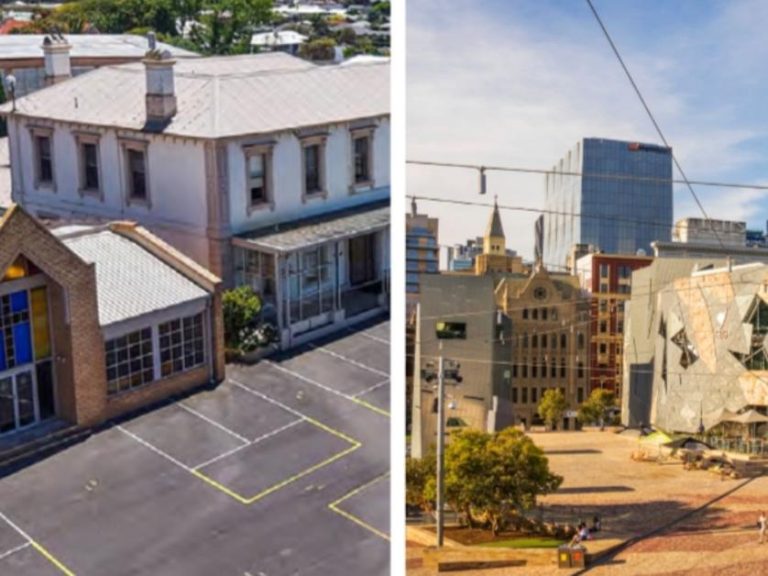The North Geelong jobs boom from city’s economic pivot

Hamilton Group director Andrew Hamilton, Hamilton Group general manager Penny Hamilton, Hamilton Group managing director Cameron Hamilton. Picture: Lucas Nieuwenhuys.
The success of a project reshaping dormant industrial complexes to a model business park in Geelong’s north is best judged within its walls.
Businesses at Pivot City Innovation District employ more than four times the people at the North Geelong site than the manufacturers that shut in the early 2000s.
While Pivot City added a national Urban Development Institute of Australia award for urban renewal to a state plaudits for its owners, Hamilton Group, the precinct is approaching full capacity and is expected to cater for around 1300 employees.
Mackay St, North Geelong has become a beacon for the renaissance in regional Australia.
RELATED: Golden Triangle scores big for renovation plans
Landmark Corio motel freehold sold in multi-million deal
Shipping containers make a splash in Leopold pool house
Director Andrew Hamilton said conversation about the drive to regional areas always stopped at residential real estate, but judges held this commercial project as a prime example for what regional cities and towns could be.
Federal Mills and the Glass House were originally the Federal Woollen Mills and an old Pilkington automotive glass factory, supplying components to the nearby Ford plant.
The heritage-listed buildings were no longer fit for industrial purpose but have become spaces that tick the boxes for employee retention, collaboration and wellbeing.
“Every step from us is understanding where every floorboard has come from to having a walkable masterplan for the site stuck with the judges,” Mr Hamilton said.

Sebastian Reaburn master distiller at TSI and committee member of Australian Distillers, left, Australian Distillers and founding member Cam Syme, and Anther Distillery founder and distiller Derv McGowan were part of the Australian Distillers annual conference. Anther Distillery is a tenant at Federal Mills. Picture: Alison Wynd
“Quite often renewal projects are ‘facadism’ where they’ll take a heritage building and gut it and have a tower come out the top and have a couple of old photos when you walk in.
“There are so many of these classic buildings around regional Australia and the judges said we’ve created a space which is the exact kind of working environment that someone who has decided they don’t want to work in the city any more want to work in,” he said.
At last estimate, Mr Hamilton said there were 1100 to 1200 employees on site.
“We’ve got heads of agreement going out on a space at Federal Mills, which will put us at 100 per cent capacity,” he said.

The Hamilton Group has converted a Pilkington factory to the Glasshouse at its Pivot City innovation precinct. Picture: Supplied.
“That’s been a long journey. We’re at least 95 per cent at Glass House, with a lot of tenants coming that are not yet occupying the site.
“The car parks are full and we’ll predict about 1300 on-site jobs at the moment.”
That’s more than four times the jobs on site compared to when Pilkington (80 people) and Classweave Industries (200 people) closed in the early 2000s and comes at a time when Geelong’s population growth was the nation’s fastest during the pandemic.
The current tenants includes legal, accounting, consulting, IT, construction services, co-working and business incubation services.

Deakin University unveiled its solar car to enter the 2023 World Solar Car Challenge at Federal Mills in March. Picture: Alan Barber
The largest cohort were port or industry-related and included government agencies such as the Environment Protection Authority and Ports Victoria, Mr Hamilton said.
Geelong’s port precinct stretches about 5km north Mackay St.
“We’ve also been talking to Deakin about ManuFutures (a manufacturing innovation hub at the University’s Waurn Ponds campus) about where businesses go after ManuFutures,” he said.
“We’ve had plenty of interest from them as well because they need small scale but high amenity environments with industrial components, which aren’t 50,000sq m sheds. They need 500-1000sq m and we want them out there.”

Inside the now-renovated Federal Mills site in Geelong. The buildings have been redeveloped by The Hamilton Group as a commercial precinct including offices, hospitality and services. Federal Mills was built about 1915. Picture: Supplied by National Wool Museum.
UDIA Victorian chief executive Matthew Kandelaars said the project was symbolic of Geelong’s growth story and the pivot from its industrial roots to a vibrant place to work.
“There is a lot of appetite to get there,” he said.
“Through Covid it has accelerated the rate of movement to Geelong or kept people in Geelong. What you’re starting to see now, particularly with this hybrid style of working, is the need to attract and retain talent.”

Federal Mills at Pivot City Innnovation District. Picture: Alan Barber
Mr Kandelaars said it provides a little bit of nuance and depth to the commercial property market in Geelong.
“It wouldn’t be out of place in Melbourne or Sydney,” he said.
He said he campus style precinct also encouraged collaboration.
“More and more we’re seeing the need and desires for tenants these days are changing and its more holistic.
“There are some really cool companies there that are collaborating and co-existing in this great precinct.”






